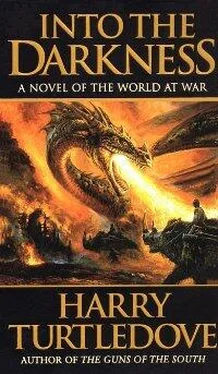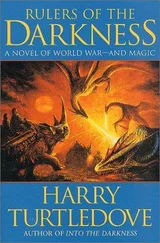And, just as Cornelu had guessed, the rest of the Algarvian navy had followed the invasion fleet south. Algarvian and Sibian ships were tossing eggs at each other outside the harbor, and blazing with powerful sticks. Every time a beam went low, a great cloud of steam rose from the ocean.
Eforiel shuddered beneath Cornelu. She paid no attention to the beams, but eggs bursting in the water frightened her. She had reason to fear, too; a burst too near might kill her. Cornelu dared approach Facaceni no closer.
A puff of steam rising only a couple of hundred yards away warned that he might already have come too close. It came not from a stick but from another leviathan spouting. A moment later, leviathan and rider broke the surface. “Who are you?” the rider called to Cornelu.
Was he speaking Algarvian or Sibian? With only three words to go on, Cornelu had trouble being sure. “Who are you?” he called back. “Give me the signal.” He did not know what the signal was, but hoped to learn more by the way the other leviathan rider responded.
Learn he did, for the fellow said, “Mezentio!”
“Mezentio!” Cornelu answered, as if he too were an Algarvian, and delighted to find another one in this part of the world. But, while his mouth spoke the name with every sign of gladness, his hand delivered a different message to Eforiel: attack!
The leviathan’s muscles surged smoothly beneath him as she arrowed through the water toward the other rider and his mount. Calling Mezentio’s name must have lulled the Algarvian, for he let Cornelu and Eforiel approach without taking any precautions against them.
He learned his mistake too late. Eforiel’s pointed snout rammed his leviathan’s side, not far behind the creature’s left flipper. The impact almost pitched Cornelu off Eforiel’s back, though he was as well strapped and braced as he could have been. The Algarvian leviathan twisted and jerked in startled agony, much as a man might have done if unexpectedly hit in the pit of the stomach.
After delivering that first blow with her jaws closed, Eforiel opened them and bit the other leviathan several times. Blood turned seawater crimson. Cornelu laughed to see the Algarvian rider splashing in the ocean, separated from his mount. Eforiel did the Algarvian no harm. She had not been trained to hunt men in the water—too much likelihood of her turning on her own rider, should some mischance have separated the two of them.
Had circumstances differed, Cornelu might have captured the other rider. But he doubted he had any place on Sibiu to which he could bring the Algarvian for interrogation. And he spied other spouts not far away. He had to assume they came from Algarvian leviathans.
When he ordered Eforiel to break off the attack, he thought for a moment she would refuse to obey him. But training triumphed over instinct. She allowed the leviathan she’d wounded to flee into the depths of the sea. Cornelu did not think a Sibian-trained animal would have abandoned its rider like that—but the Algarvians, as he’d seen to his sorrow, had tricks of their own up their sleeves.
And they had these leviathans. “Mezentio!” their riders called, hurrying toward the commotion at least one of them had spotted.
Cornelu did not think he could fool them as he had the first Algarvian he’d encountered; few tricks worked twice. Nor, being outnumbered, was he ashamed to flee. He hoped to escape them and then go on looking for Sibians still resisting the invaders.
In war, though, what one hopes and what one gets are often far removed from each other. The Algarvians pursuing Eforiel were better riders than most of their countrymen, and mounted on sturdier leviathans. They chased Cornelu far to the south of Facaceni, and seemed intent on driving him from Sibian waters altogether.
To make matters worse, a dragon flew high over Eforiel, helping the Algarvians and their leviathans keep track of her. The dragonflier was sure to be speaking into a crystal. If one of the riders was likewise equipped… If that was so, the Algarvians had devoted a great deal of effort to tying their forces together in ways no one had thought of before.
Another dragon came flapping up behind the first. This one carried a couple of eggs slung under its belly, and did its best to drop them on Eforiel. The flier’s aim, though, was not so good as it might have been. Both eggs fell well short of their intended target; one, in fact, came closer to hitting the Algarvian leviathan riders than it did to Cornelu.
He hoped that would make the enemy lose him, but it didn’t. Cursing the Algarvians, he kept Eforiel headed southeast, the only direction in which they permitted him to travel. He shook his fist at them. “Force me to Lagoas, will you?” he shouted.
Lagoas was neutral. If he came ashore there, he would be interned, and out of the fighting till the war was over: a better fate than surrendering, but not much. He cursed the Lagoans even more bitterly than he did the Algarvians. In the Six Years’ War, Lagoas had fought alongside Sibiu, but this time around her merchants had loved their profits too well to feel like shedding any blood.
And then, as if thinking of Lagoans had conjured them up, a patrol boat came speeding along a. ley line from out of the south. He could have escaped it. The ocean was wide, and the ship could not leave the line of energy from which it drew its power. But, if he was going to be interned, sooner struck him as being as good as later. This way, as opposed to his coming ashore on their soil, the Lagoans might heed his wishes about Eforiel. And so he waved and had the leviathan rear in the water and generally made himself as conspicuous as he could.
The Algarvian leviathan riders turned and headed back toward Sibiu. Cornelu shook his fist at them again, then waited for the Lagoan warship to approach. “Who might you be?” an officer called from the deck in what might have been intended for either Sibian or Algarvian.
Cornelu gave his name, his rank, and his kingdom. To his surprise, the Lagoans burst into cheers. “Well met, friend!” several of them said.
“Friend?” he echoed in surprise.
“Friend, aye,” the officer answered in his accented Sibian. “Lagoas wars with Algarve now. Had you no heard? When Mezentio your country invaded, King Vitor declares war. We all friends together now, aye?”
“Aye,” Cornelu said wearily.
Skarnu stood up before his company and said the words that had to be said: “Men, the redheads have gone and invaded Sibiu. You’ll have heard that already, I suppose.” He waited for nods, and got them. “You ask me,” he went on, “they were fools. Lagoas is a bigger danger to them than Sibiu ever could have been. But if the Algarvians weren’t fools, they wouldn’t be Algarvians, eh?”
He got more nods, and even a couple of smiles. He would have been gladder of those smiles had they come from the best soldiers in the company, not the happy-go-lucky handful who in the morning refused to worry about the afternoon, let alone tomorrow.
“We can’t swim over to Sibiu to help the islanders,” he said, “so we have to do the next best thing. King Mezentio must have pulled a lot of his soldiers out of the line here when he invaded Sibiu. That means there won’t be enough men left in the redheads’ works to hold us back when we hit them. We are going to break through, and we are going to go rampaging right into the Algarvian rear.”
Some of the men who’d smiled before clapped their hands and cheered. So did a few others—youngsters, mostly. Most of the soldiers just stood silently. Skarnu had studied the Algarvian fortifications himself, studied them till he knew the ones in front of him like the lines on his palm. As long as they held any men at all, they would be hard to break through. He knew it. Most of the men knew it, too. But he had his orders about what to tell them.
Читать дальше












